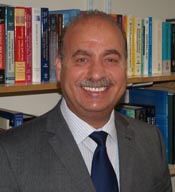Please note, this page has been archived and is no longer being updated.
Professor Nidal Hilal, Director of the Centre for Advanced Technologies and Environmental Research (CWATER) at Swansea University’s College of Engineering, will be chairing the prestigious 3rd International Conference on Desalination using Membrane Technology 2 - 5 April 2017 at the Palacio de Congresos de Canarias in Las Palmas, Gran Canaria, Spain.
The Conference will explore addressing the urgent and increasing need for better provision of clean water of drinking quality on a worldwide basis through using membranes. Professor Hilal’s team in the Chemical Engineering at Swansea University is internationally leading in this field.
The lack of clean water is the direct cause of millions of deaths every year in poorer countries, while in most affluent countries the demand for such water is continuously increasing. Thus, the development of new means to produce drinking water is a high priority for international organisations, governments and research agencies.
Sustainable development of effective desalination processes can make a major contribution to meeting the demand for drinking water, and desalination using membranes is the most promising of the new approaches. However, the technology raises a number of energy efficiency as well as environmental and sustainability issues which will also be covered in this conference.

Professor Nidal Hilal the director of CWATER and Editor-in-Chief of the international journal Desalination said: "Over 1 billion people, mostly in developing countries, currently lack access to clean drinking water, whilst another 2.6 billion lack adequate sanitation. It has been estimated that by the year 2050, half of the world’s population will face severe water shortages. In addition, it is expected that the world’s population will increase by 40 to 50% over the next 50 years to reach 9 billion. However, the amount of fresh water naturally available cannot match this overwhelming demand. This has direct consequences on feeding the world’s population in 2050 as it will take 50% more fresh water than what we use today. “
Professor Hilal is an expert in this field and has produced over 400 scientific papers and 7 major handbooks on the subject.
Professor Hilal added “How can we secure enough fresh water – and food – for the future? Which is why, as the world’s population explodes, we have to ask ourselves, do we fight for fresh water now or sit back and wait for a global food crisis? What can engineers do to access more fresh water and prevent a global food crisis? The most viable alternative, as it stands now, is to tap into the large amount of seawater that is readily available across the world, through desalination processes”.
Professor Hilal concluded “The global desalination market is expected to exceed US$52 billion by 2020 and reverse osmosis membrane technology segment will see the largest growth, reaching around US$40 billion by 2020.”
Full information about the conference can be found on: https://www.elsevier.com/events/conferences/desalination-using-membrane
Full information about the College of Engineering research can be found on (http://www.swansea.ac.uk/engineering/)
Full information about Professor Hilal’s work can be found on http://www.swansea.ac.uk/staff/engineering/n.hilal/
Full information about the Centre for Water Advanced Technologies and Environmental Research (CWATER) can be found on (http://www.swansea.ac.uk/cwater/
- Thursday 16 March 2017 15.41 GMT
- Thursday 16 March 2017 15.45 GMT
- Swansea University, Tel: 01792 295050
